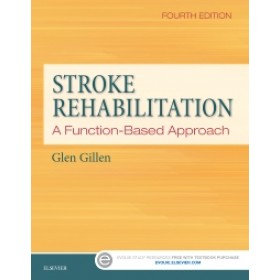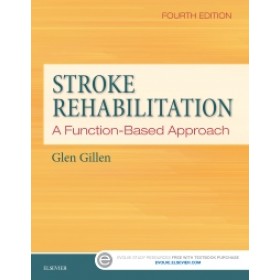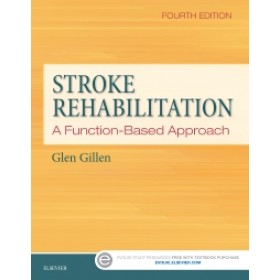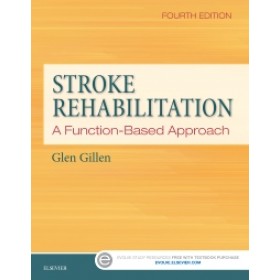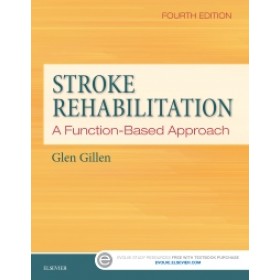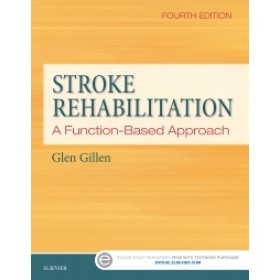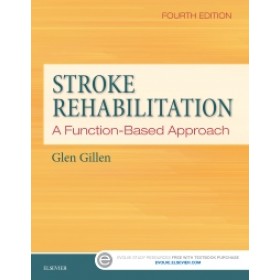Details
Stroke Rehabilitation: A Function-Based Approach, 4th Edition: Module 2
SKU: 782
by Glen Gillen, EdD, OTR, FAOTA
These courses are offered in cooperation with Elsevier Health and utilize the hardback textbook, “Stroke Rehabilitation: A Function-Based Approach, 4th Edition” by Glen Gillen, EdD, OTR, FAOTA.
Learn to confidently manage the growing number of stroke rehabilitation clients with these exciting new courses! Using a holistic and multidisciplinary approach, this text remains the only comprehensive, evidence-based stroke rehabilitation resource for occupational therapists. The new edition has been extensively updated with the latest research in assessment and intervention, along with more evidence-based research added to every chapter. As with previous editions, this comprehensive reference uses an application-based method that integrates background medical information, samples of functionally based evaluations, and current treatment techniques and intervention strategies.
Module 1: covers pathophysiology, medical management and acute rehabilitation of stroke survivors, psychological aspects of stroke rehabilitation and improving participation and quality of live through occupation.
Module 2: covers the task-orientated approach, activity-based interventions in stroke rehabilitation and approaches to motor control dysfunction.
Module 3: covers trunk control, balance impairments and vestibular rehabilitation when performing stroke rehabilitation.
Module 4: covers upper extremity function and management and rehabilitation technologies to promote upper limb recovery after a stroke.
Module 5: covers edema control, splinting applications and functional mobility after a stroke.
Module 6: covers gait awareness, managing visual and visuospatial impairments to optimize function in patient who have had strokes and the impact of neurobehavioral deficits on activities of daily living.
Module 7: covers enhancing the performance of activities of daily living after a stroke, the treatment of cognitive-perceptual deficits using a function-based approach and managing speech and language deficits after a stroke.
Module 8: covers driving and community mobility as an instrumental activity of daily living, parenting after stroke, dysphagia management and sexual function and intimacy after a stroke.
Module 9 covers adaptations for activities of daily living, leisure activity participation after stroke, seating and wheeled mobility prescription and home evaluation and modifications for stroke patients.
Course Length: 8.0 contact hours
Instructional level: Intermediate
This package contains the reading and testing materials for Module 2 only.
Stroke Rehabilitation: A Function-Based Approach, 4th Edition: Module 2
Course Goals and Objectives:
Course Goals: This course is intended to instruct the student, through self-paced study, on the task-orientated approach and activity-based intervention in stroke rehabilitation and on approaches to motor control dysfunction.
Student Objectives:
At the end of this course, the student will be able to:
1. Identify the role of the nervous system in the Systems Model of Motor Control.
2. Identify the basis of the Dynamical Systems Theory of Motor Control.
3. Identify the premise of motor development in the Systems View of Motor Development.
4. Identify the term “dyad training”.
5. Identify the Systems Model of Motor Behavior and how it relates to the Occupational Therapy Practice Framework.
6. Distinguish between the steps in the evaluation framework based on a Systems Model of Motor Behavior.
7. Identify the use of contemporary motor learning principles in client treatments and practice schedules
8. Identify key components for constraint induced movement therapy (CIMT).
9. Discriminate between factors within the individual and factors within the environment when planning OT interventions.
10. Identify 3 phases of learning.
11. Distinguish between the 4 cognitive strategies developed by Toglia and Golisz.
12. Identify 5 motor strategies after stroke proposed by Carr and Shepherd.
13. Identify the first step in developing effective activity-based interventions.
14. Identify the correct body positions for optimal postural set.
15. Identify the role of the occupational therapist as a stroke survivor develops their own alternative strategies for task performance.
16. Identify the principles of evidence-based practice and the criteria of evaluating research
17. Evaluate the recent studies of constraint induced movement therapy and apply the results to previously held views.
18. Evaluate the recent studies of task-related training and their effectiveness on patient rehabilitation.
19. Evaluate the recent studies of modified constraint induced movement therapy.
20. Evaluate the recent studies of robot-assisted training in stroke rehabilitation.
